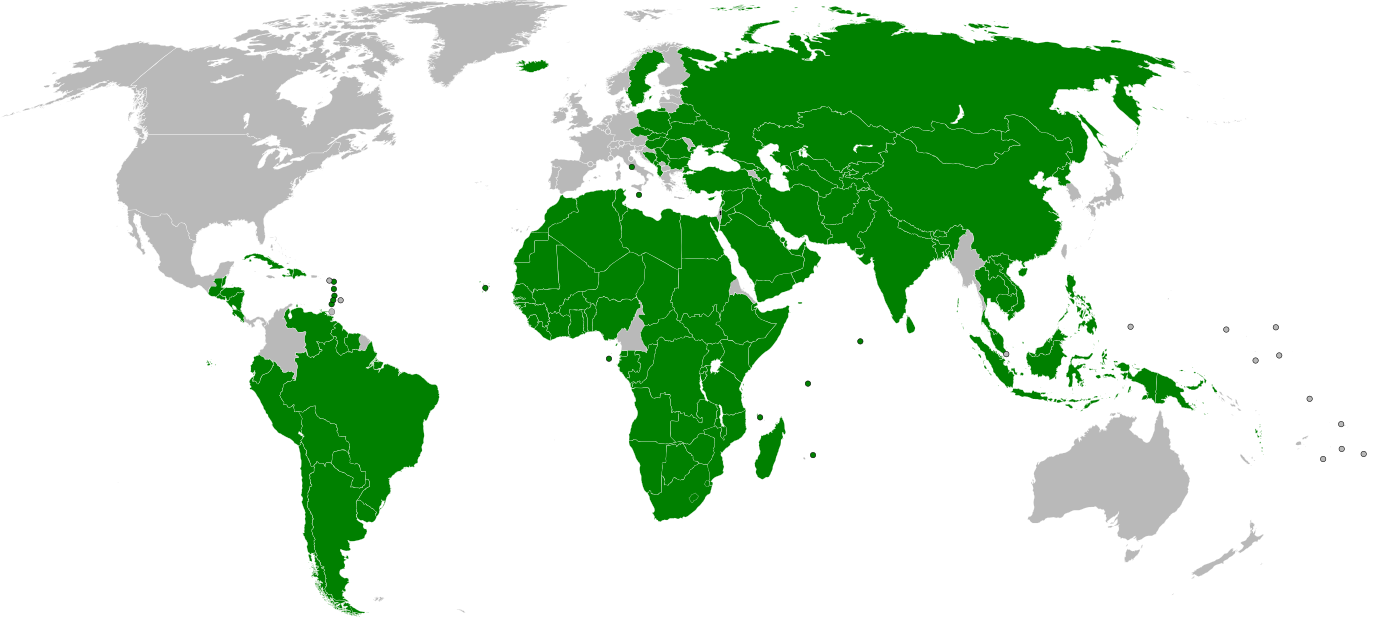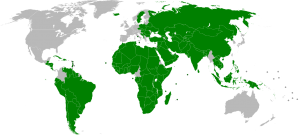The United Nations and the Palestine Liberation Organization


Map: Countries that have recognized the state of Palestine
By Brian Carter
The United Nations’ handling of the Palestine Liberation Organization throughout the 1960’s and 1970’s, while criticized by a Western-backed coalition spearheaded by the United States and Israel, should be praised for its long-term successes. Where many nations opt to play the short game, the United Nations appears to have actually analyzed the deeper, more latent issues pestering the region, offering a solution whose approach, unlike previous failed peace attempts, is bilateral, acknowledging both Israel and Palestine’s right to exist in the region. The United Nations’ strategy has also removed a great deal of the justification behind terrorist attacks attributed to the P.L.O. and its client organizations, including the P.F.L.P., D.F.L.P., and al-Fatah, by offering them a venue to have their grievances voiced peacefully.
Starting with an analysis of the timeline of terrorist attacks orchestrated under the auspices of or approved by the P.L.O., the number of terrorist attacks committed by the P.L.O. following their recognition by the United Nations in 1974 decreased significantly, with thirteen major attacks–i.e. airline hijackings, bombings, embassy sieges, and hostage situations–being committed between 1964–the year of the P.L.O.’s foundation–and 1974, with only five major attacks committed between 1974 and the signing of the Oslo Accords in 1993, including the First Intifada.[1] Considering terrorism did not adopt a radical Islamic character until the Iranian Revolution of 1979–“The year 1979 was a turning point in international terrorism. Throughout the Arab world and the West, the Iranian Islamic revolution sparked fears of a wave of revolutionary Shia Islam…”[2]–the P.L.O.’s main grievance was their view that Israel was an occupying force, unlawfully controlling territory which ostensibly belonged to the Palestinian people, further displaced by Israel’s inception in 1948. The United Nations’ decision to recognize Palestine and offer the P.L.O. observer status in 1974–which received equal parts praise and condemnation from the international community–led to a gradual decrease in P.L.O. orchestrated terror attacks, considering the Organization no longer needed to resort to hijacking airliners to get their voices heard.
The United Nations’ approach during the 1970’s, a decade that witnessed a spike in American interest in the Middle East following the end of the Vietnam War and their policy of detente toward the U.S.S.R., was uniquely bilateral. They not only recognized the P.L.O. in their Resolution 3375, but also condemned Israel in Resolution 3379 the following year, censuring their treatment of Palestinians and stating “Zionism is racism.”[3] Their approach to the issue of Palestinian statehood was incredibly fair and moderate, placing equal blame and praise on both parties involved–the state of Israel and Palestine. As such, instead of adopting a partisan approach, such as those adopted by the Soviet Union and United States, the United Nations opted for the middle ground, attempting to flesh out a path where both parties could not only receive equal attention but negotiations could be undertaken in a peaceful environment complete with mutual conciliation and where open warfare, like the 1948 Arab-Israeli War, the Six Day War of 1967, the 1973 October War, and Israel’s invasion of Lebanon in 1982.
The importance of the United Nations’ achievement in recognizing Palestine, evidenced by the reduction in terrorist attacks following its official recognition in 1974 and the signing of the Oslo Accords in 1993, not only brings stability to a region previously lacking it but can also be utilized as a model for future issues regarding stateless entities; with the issue of the hypothetical Kurdistani state once again coming to the forefront during the ongoing Syrian Civil War, the United Nations has been presented with a unique opportunity to do for Kurds what they succeeded in achieving for Palestinians–international recognition. On top of that, Kurdistan’s history is strikingly similar to that of Palestine, including a series of contradictory treaties drafted by European powers both promising the establishment of and subsequently reneging on a state, as well as their dispersion over multiple states which either refuse to acknowledge them as people–i.e. Turkey and Iraq regarding their large Kurdish minorities–or their treatment as unwanted guests–i.e. the Palestinians’ treatment by Jordan, Lebanon, Syria, and Saudi Arabia between the 1950’s and 1980’s.
[1] “Yasser Arafat’s Timeline of Terror.” Committee For Accuracy in Middle East Reporting in America (2004).
[2] John Moore. “The Evolution of Islamic Terrorism: An Overview.” PBS (2014).
[3] United Nations General Assembly Resolution 3379, 10 November 1975.